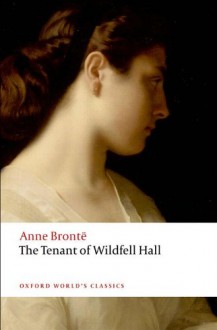 It took me a bit to get into this, because Gilbert Markham is a nice but exasperating young man. Little was I to know that compared to the other men I'd meet in this novel, Gilbert is a paragon of niceness and virtuous thoughts (that aren't always able to stop his rash actions). Also took me a while to sink back into enjoying the lengthy explanatory style of discourse practiced in this time period.
It took me a bit to get into this, because Gilbert Markham is a nice but exasperating young man. Little was I to know that compared to the other men I'd meet in this novel, Gilbert is a paragon of niceness and virtuous thoughts (that aren't always able to stop his rash actions). Also took me a while to sink back into enjoying the lengthy explanatory style of discourse practiced in this time period. The titular tenant is Helen Graham. She's a mysterious widow with lustrous black hair, has a young son, and is an accomplished artist - in fact, that's how she makes her living when Gilbert becomes acquainted with her. The story is framed thus: Gilbert is recounting his first meeting Helen to his brother in law through letters. A third of the way through the book, Gilbert is given Helen's diary to read as an explanation of why she has to keep away from society and why he shouldn't be jealous of her landlord, Frederick. Most of the book is the contents of the diary, apart from switching back to Gilbert's voice at the end. So Gilbert is really a framing device to know Helen's story - it's almost unnecessary to have Gilbert there except as an outside eye to the proceedings, I guess? Helen is the core, and she's the reason this story is so compelling to me. Even though she is very strict and moral, she doesn't come across as a nag or a prude or any other stereotype. All the characters in this book, even through the language that sounds older to our ears, are very fresh and people we've all been or known or come across in life. Anne B. builds from life and her people are so vivid.
The main point is that Helen marries someone and then realizes he's worthless and mean-spirited and controlling and his friends are all also terrible in different ways. As the foreward says, it's an effective depiction of what it is like to be in a situation where you are humiliated and betrayed but have to submit to it. And it seems like Anne might have felt this way from real life, being the youngest and most dismissed in her family (and also having a brother who died of the side effects of alcoholism due to a broken heart). Scandal.

 Log in with Facebook
Log in with Facebook 






